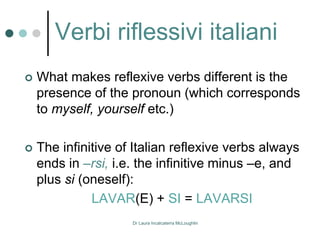Strutture linguistiche u6
- 1. DIPLOMA IN ITALIAN Strutture linguistiche U6 Dr Laura Incalcaterra McLoughlin
- 2. Strutture linguistiche Structures encountered in Unità 6 : • Reflexive verbs • Adverbs of frequency • Expressions of frequency Dr Laura Incalcaterra McLoughlin
- 3. VERBI RIFLESSIVI Reflexive verbs Dr Laura Incalcaterra McLoughlin
- 4. Verbi riflessivi •A verb is reflexive when the action is performed on the subject. For example the verb to wash oneself is a reflexive verb because the person who is doing the action of washing is also the person who is receiving the action of being washed. Note the difference between • I wash myself → mi lavo (reflexive) • I wash the car → lavo la macchina (NOT reflexive) Dr Laura Incalcaterra McLoughlin
- 5. Verbi riflessivi italiani  What makes reflexive verbs different is the presence of the pronoun (which corresponds to myself, yourself etc.)  The infinitive of Italian reflexive verbs always ends in –rsi, i.e. the infinitive minus –e, and plus si (oneself): LAVAR(E) + SI = LAVARSI Dr Laura Incalcaterra McLoughlin
- 6. To conjugate reflexive verbs:  just detach the last four letters of the infinitive and add the usual endings: LAVARSI – follows the pattern of verbs in –are RADERSI – follows the pattern of verbs in –ere VESTIRSI – follows the pattern of verbs in –ire  Reflexive verbs are always preceded by the reflexive pronoun, as follows: Dr Laura Incalcaterra McLoughlin
- 7. lavarsi radersi vestirsi To wash (oneself) To shave (oneself) To dress (oneself) io mi lav-o rad-o vest-o tu ti lav-i rad-i vest-i lui/lei/Lei si lav-a rad-e vest-e noi ci lav-iamo rad-iamo vest-iamo voi vi lav-ate rad-ete vest-ite loro si lav-ano rad-ono vest-ono Dr Laura Incalcaterra McLoughlin
- 8. Some useful reflexive verbs: addormentarsi to fall asleep mettersi to put (clothing) on alzarsi to get up pettinarsi to comb oneself arrabbiarsi to get angry radersi to shave chiamarsi to be called sedersi to sit divertirsi to enjoy oneself sentirsi to feel (good/ bad…) farsi (la doccia, il to have a shower / spogliarsi to undress bagno) a bath farsi male to get hurt / to hurt svegliarsi to wake up oneself lavarsi to wash oneself truccarsi to put makeup on laurearsi to graduate vestirsi to get dresses Dr Laura Incalcaterra McLoughlin
- 9. DOVERE / POTERE / VOLERE + Reflexive verb: A B 1) Reflexive pronoun + 1) Dovere/potere/volere + 2) Dovere/potere/volere + 2) Infinitive WITH reflexive 3) Infinitive pronoun ATTACHED Mi voglio svegliare alle 7 Voglio svegliarmi alle 7 Ti devi alzare presto Devi alzarti presto Ci possiamo sedere? Possiamo sederci?
- 10. AVVERBI DI FREQUENZA Adverbs of frequency Dr Laura Incalcaterra McLoughlin
- 11. Ogni quanto…?  Adverbs of frequency answer the question Ogni quanto…? (how often?)  They are: NOTE THE POSITION OF THE ADVERB --- non … mai Non vado mai a teatro -- raramente Vado a teatro raramente - ogni tanto / qualche volta Ogni tanto / qualche volta vado a teatro + spesso Vado spesso a teatro / Spesso vado a teatro ++ di solito Di solito vado a teatro con gli amici + + + sempre Vado sempre a teatro con gli amici. Dr Laura Incalcaterra McLoughlin
- 12. ALTRE ESPRESSIONI DI FREQUENZA Other expressions of frequency Dr Laura Incalcaterra McLoughlin
- 13. Ogni quanto…? NOTE THE POSITION OF EXPRESSION Una volta alla settimana Vado a teatro una volta alla settimana Once a week Due volte alla settimana Vado a teatro due volte alla settimana Twice a week Una volta al mese Vado a teatro una volta al mese Once a month Una volta all’anno Vado a teatro una volta all’anno Once a year Ogni giorno / settimana / Vado a teatro ogni settimana mese / anno Every day / week / month / year (Note that ogni never changes) Dr Laura Incalcaterra McLoughlin

























































